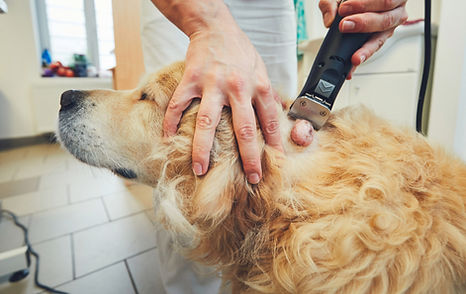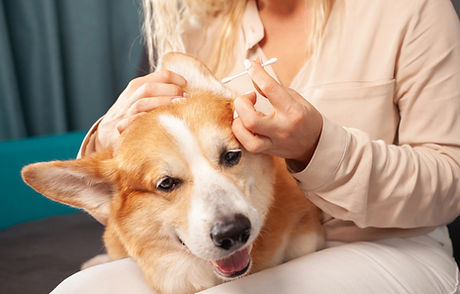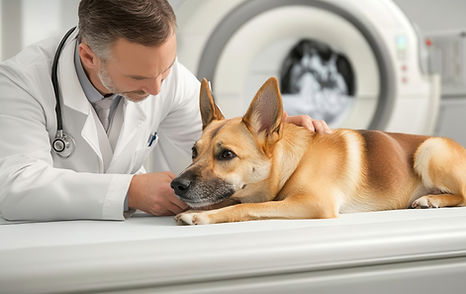Causes of HeAring loss

Congenital Hearing loss

Genetics: Some animals are born with genetic conditions that affect their hearing. These congenital issues can result from inherited genetic mutations or developmental anomalies during gestation. For example, certain breeds of dogs and cats are more prone to congenital deafness due to specific genetic traits. In dogs, breeds like Dalmatians, Australian Shepherds, and Bull Terriers are known to have higher incidences of congenital deafness, often linked to the presence of the piebald or merle coat patterns.
These genetic conditions can affect the inner ear structures, such as the cochlea, or the auditory nerve, leading to partial or complete hearing loss.
Early detection through hearing tests and genetic screening can help manage and accommodate these animals’ needs, ensuring they lead healthy and fulfilling lives.
Acquired Hearing Loss

Ear infections in animals, can damage the structures of the ear, leading to temporary or permanent hearing loss. These infections, often caused by bacteria, yeast, parasites (like ear mites), or foreign bodies, can result in inflammation and fluid buildup. This can impair the movement of the eardrum and ossicles (tiny bones in the middle ear), leading to hearing difficulties. If left untreated, severe infections can cause complications such as tympanic membrane perforation (eardrum rupture) or chronic otitis media.
Trauma: Injuries to the head or ear can impair hearing in animals. Trauma that can result from accidents, falls, fights, or even excessive scratching due to ear infections or parasites. These injuries can damage the delicate structures of the ear, including the eardrum, ossicles (tiny bones in the middle ear), and inner ear components. Trauma can cause bleeding, inflammation, or rupture of the eardrum, leading to temporary or permanent hearing loss. In severe cases, head injuries can also affect the auditory nerve or brain regions responsible for processing sound, further impairing hearing.
Prompt veterinary care is essential to assess the extent of the damage, provide appropriate treatment, and prevent long-term hearing loss.
.jpeg)
.jpeg)
Noise Exposure : Noise exposure can significantly impact animals, including our beloved dogs. Just like humans, dogs can suffer from both temporary and permanent hearing loss due to loud noises. This can affect their ability to communicate, navigate, and even their overall well-being. For instance, loud fireworks or constant urban noise can stress dogs and damage their hearing over time. Understanding these effects is crucial for ensuring our pets’ health and for broader conservation efforts to protect wildlife from noise pollution. By being mindful of noise levels, we can help keep our furry friends’ ears safe and healthy.
Aging: As animals age, the structures of the ear can deteriorate, leading to hearing loss. This age-related hearing loss, known as presbycusis, is a gradual process that affects the inner ear’s sensory cells, particularly the hair cells in the cochlea responsible for detecting sound vibrations. Over time, these hair cells can become damaged or die off, reducing the animal’s ability to hear high-frequency sounds first, followed by lower frequencies. Additionally, the auditory nerve and other neural pathways involved in hearing can also degenerate with age, further contributing to hearing loss. Symptoms of hearing loss in aging animals may include a decreased response to commands, difficulty waking up, or a lack of reaction to everyday noises.
Regular veterinary check-ups can help monitor hearing health and provide supportive care to enhance the quality of life for senior pets.

.jpeg)
Ototoxic medications can lead to significant hearing loss in animals, including dogs and horses. These medications, which include certain antibiotics, diuretics, and chemotherapy drugs, can damage the inner ear structures, resulting in both temporary and permanent hearing impairment. In dogs, this can manifest as unresponsiveness to sounds, disorientation, and changes in behavior. Horses, though less commonly affected, may also experience reduced responsiveness to vocal commands and environmental sounds. Understanding the risks associated with ototoxic medications is crucial for pet owners and veterinarians to ensure the health and well-being of these animals. Regular monitoring and careful management of medication use can help mitigate these risks and protect their hearing health.
Tumors : Hearing loss in animals can be caused by tumors or growths in the ear canal, around the auditory nerve, or in surrounding areas. These tumors can obstruct or damage the auditory pathways, leading to partial or complete hearing impairment. In dogs and horses, such growths can interfere with their ability to detect and respond to sounds, affecting their communication and behavior. Early detection and treatment are crucial to managing these conditions and preserving the animal’s hearing health. Regular veterinary check-ups and monitoring for signs of hearing loss can help ensure timely intervention and improve the quality of life for affected animals
.jpeg)
.jpeg)
Ear Wax : Hearing loss in animals can often be caused by the accumulation of ear wax, which can block sound transmission. This build-up can obstruct the ear canal, preventing sound waves from reaching the inner ear and leading to partial or complete hearing impairment. Dogs and horses, like humans, can suffer from this condition, which may result in decreased responsiveness to sounds and changes in behavior. Regular ear cleaning and veterinary check-ups are essential to prevent excessive wax build-up and maintain healthy hearing. By keeping their ears clean, we can help ensure our pets and animals stay alert and responsive to their surroundings.
Neurologic conditions can lead to hearing loss in animals, with diseases such as meningitis and epilepsy being notable examples. These conditions can damage the auditory pathways or the brain regions responsible for processing sound, resulting in partial or complete deafness. In dogs and horses, neurologic issues can manifest as sudden or progressive hearing loss, often accompanied by other symptoms like disorientation, seizures, or changes in behavior. Early diagnosis and treatment are crucial to managing these conditions and mitigating their impact on hearing. Regular veterinary check-ups and monitoring for signs of neurologic distress can help ensure the well-being of affected animals.
.jpeg)
.jpeg)


